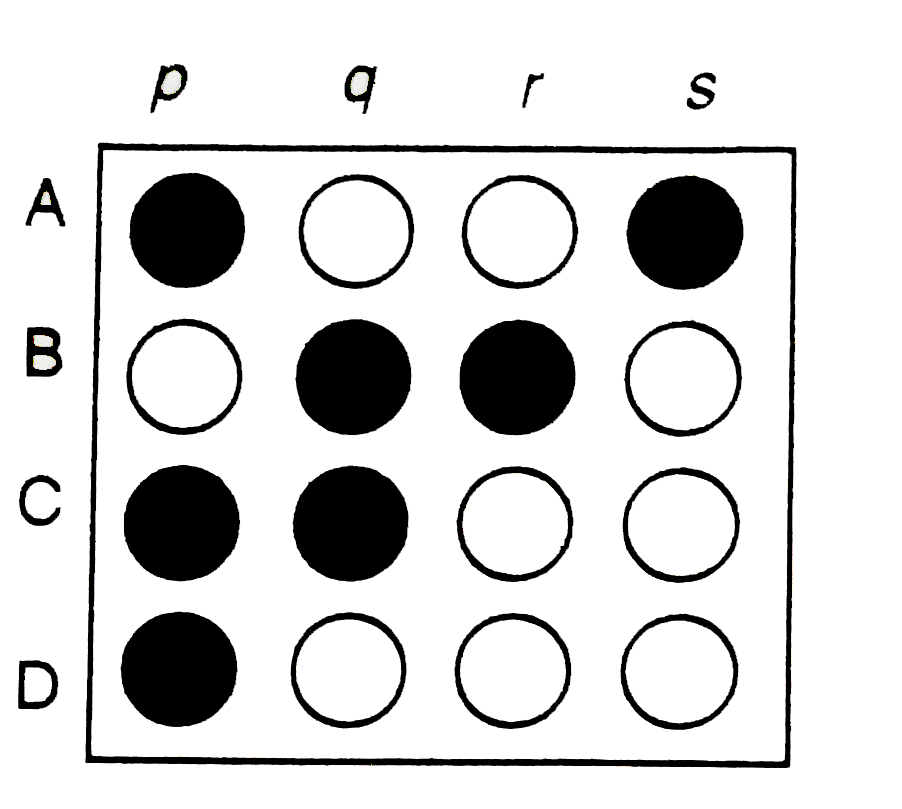The oxide which cannot act as reducing agent is
The correct Answer is:C
To determine which oxide cannot act as a reducing agent, let's analyze the oxidation states and properties of common oxides.
1. Understanding Reducing Agents: A reducing agent is a substance that donates electrons in a chemical reaction and gets oxidized itself. For an oxide to act as a reducing agent, it must be able to increase its oxidation state.
2. Identify the Oxides: We need to consider common oxides of elements from the carbon family (Group 14), particularly carbon oxides like CO and CO2.
3. Oxidation States:
- Carbon Monoxide (CO): In CO, carbon has an oxidation state of +2. It can donate electrons and can be oxidized to CO2, thus acting as a reducing agent.
- Carbon Dioxide (CO2): In CO2, carbon has an oxidation state of +4. This is the highest oxidation state for carbon.
4. Vacant D Orbitals: Carbon does not have vacant d orbitals, which means it cannot expand its oxidation state beyond +4. Therefore, it cannot be further oxidized.
5. Conclusion: Since CO2 is already in its highest oxidation state (+4), it cannot act as a reducing agent. Thus, the oxide that cannot act as a reducing agent is CO2.
Final Answer:
The oxide which cannot act as a reducing agent is CO2.
---
- Carbon Monoxide (CO): In CO, carbon has an oxidation state of +2. It can donate electrons and can be oxidized to CO2, thus acting as a reducing agent.
- Carbon Dioxide (CO2): In CO2, carbon has an oxidation state of +4. This is the highest oxidation state for carbon.
The oxide which cannot act as a reducing agent is CO2.
Topper's Solved these Questions
- THE CARBON FAMILYBOOK - DINESH PUBLICATIONCHAPTER - THE CARBON FAMILYEXERCISE - Selected straight
31 Videos
- THE CARBON FAMILYBOOK - DINESH PUBLICATIONCHAPTER - THE CARBON FAMILYEXERCISE - Matrix
2 Videos
- THE CARBON FAMILYBOOK - DINESH PUBLICATIONCHAPTER - THE CARBON FAMILYEXERCISE - Ultimate
11 Videos
- SURFACE CHEMISTRY BOOK - DINESH PUBLICATIONCHAPTER - SURFACE CHEMISTRY EXERCISE - BRAIN STORMING MULTIPLE CHOICE QUESTIONS (MCQs)
8 Videos
- THE HALOGEN FAMILYBOOK - DINESH PUBLICATIONCHAPTER - THE HALOGEN FAMILYEXERCISE - ULTIMATE PREPARATORY PACKAGE
16 Videos
Similar Questions
Which of the following minearl (s) contain SiO2 ?
View SolutionHere each questions contains statements given in two columnns which have to be matched. Statements in Column I are labelled as A, B C and D wheras the statements in Coloumn II are labelled as p,q,r and s. the answer to these questions are to be appropriately bubbled as illustrated below in the following example. if the correct matches are A-P, A-s,B-q, B-r, C p ,C-q and D-p, their correctly labelled 4 x 4 matrix should look the .

Column IColumn II(A) Sn(P) Highest density amongst group 14 elements (B) Pb(q) Lowest melting point amongst group 14 elements (C) Si(r) Lowest I.E. amongst group 14 elements(D) Ge(s) Semiconductor used in transistor
View SolutionStannous oxide can be obtained by
View SolutionFollowin are the serms about ac itivty and selectivity:
I. Acitivity is the ability of catalysts to accelerate chemical reactions and selectivity is the ability of catalysts to direct reaction to yield particular products.
II. Activity is the ability of catalyst and selectivity is the ability of catalysts to accelerate chemical reactions. Select the correct term :
View SolutionWhich of the following is soluble in water ?
View SolutionThe oxidant which cannot act as a reducing agent is
View SolutionH2O2 cannot act as reducing agent.
View SolutionWhich of the following may act as an oxidizing and reducing agent ?
View Solutionनिम्नलिखित में से कौन-सा ऑक्सीकारक तथा अपचायक दोनों का कार्य करता है-
View SolutionWhich of the following cannot act as reducing agent ?
View SolutionWhich of the following oxide cannot act as a reducing agent ?
View SolutionThe oxide which cannot act as reducing agent is
View Solutionनिम्न में से उस यौगिक को पहचानिए जो ऑक्सीकारक और अपचायक दोनों की भांति कार्य नहीं कर सकता
View Solutionकौनसा यौगिक ऑक्सीकारक और अपचायक दोनों की तरह कार्य करता है
View Solutionऑक्साइड, जो अपचायक की तरह कार्य नहीं कर सकता है
View Solution
